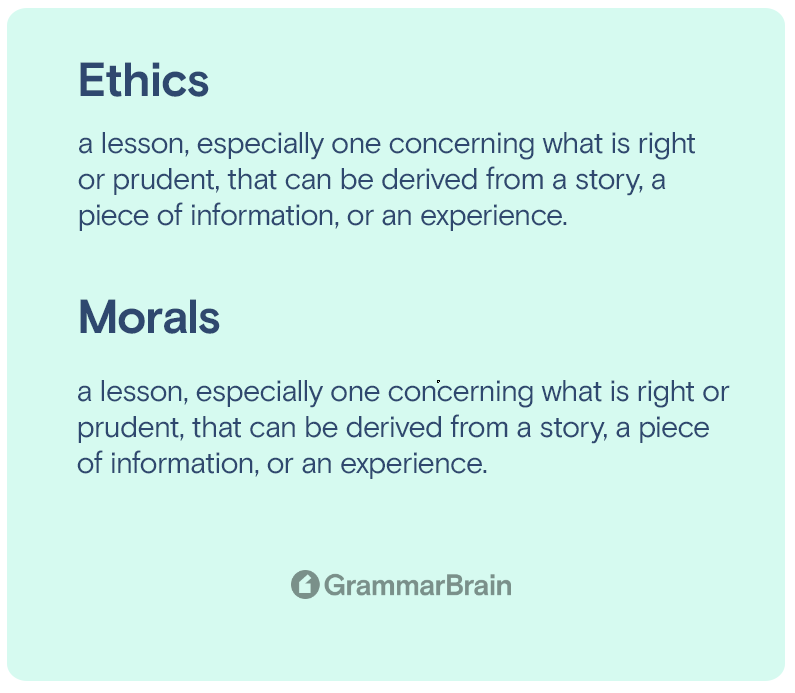What’s the difference between ethics and morals? Ethics and morality are concerned with “good” and “wrong” behavior. Although they are often used colloquially, they are not the same: Ethics refers to regulations established by an outside source, such as workplace codes of behavior or religious values. Morals are an individual’s subjective ideas of good and evil.
In this article, we’ll discuss the nuanced distinctions between ethics and morals. Also, how they intersect and whether something might be moral but not ethical, and vice versa.
| Word | Definition |
| Ethics | moral principles that govern a person’s behavior or the conducting of an activity. |
| Morals | a lesson, especially one concerning what is right or prudent, that can be derived from a story, a piece of information, or an experience. |
What’s the distinction between morals and ethics?
A person’s moral perspective is influenced by their surroundings. Moral values impact a person’s perceptions of what is good and wrong.
They frequently offer the guiding concepts for ethical frameworks. That’s where things become complicated… values are the foundation of ethics.
A moralistic person desires to do the correct thing, as well as a moral inclination typically indicates the finest intentions.
Ethics differs from morality in that it is considerably more practical.
A moral precept is an idea or belief that is motivated by a desire to do something good. An ethical code is a collection of principles that specify what acts are permissible or what behavior is acceptable.
A moral framework is not required for an ethical standard. It’s merely a set of guidelines that everyone must observe. Several professional organizations have developed ethical standards relevant to their particular areas.
In another sense, an ethical standard is not a collection of ideas or cosmic justice. It is a collection of regulations developed by industry groups to guarantee that members keep out of controversy and act in a manner that promotes the industry.

Moral vs. ethical behavior
It is critical to understand that what is ethical is not always moral, and vice versa.
A moralistic action might be unethical. let’s take the following example to understand this more precisely. A lawyer who informs the courtroom that his client is responsible for the crime done may be inspired by a moral urge to see justice being done. But such action is unethical since it compromises the attorney-client trust.
Examples
In practice, the term morality typically refers to concepts of good and wrong in personal action, such as:
- Town Topics, a gossip magazine, made sarcastic comments regarding her morality and said that she has been “taking pleasure liberally in drugs” in Newport.
- Many voters, even those who disagree with traditionalist morality, say they believe the oligarchs comprehend their points of view for practical reasons.
And ethics is typically applied to professional and business practices, such as:
- Professional organizations began to update their ethical standards to acknowledge that non-consensual dual partnerships were inescapable in some circumstances, particularly in small towns.
- Prince George’s County must tighten its ethics rules and crack down on public servants who attempt to negotiate backdoor deals.
- During a fierce discussion on Monday evening, Actor Maureen Lipman unleashed a stinging criticism of the ethical views of Channel 4’s Jewish Mum of the Year series.
Conclusion
Every person has a few values that assist them deal with almost any adversity throughout their lifetime; these concepts are regarded as ethics.
On the contrary, morals are not firm and clear laws or highly rigorous; however, they are the rules that most individuals perceive to be correct.
Because of this, they are commonly accepted. This is all to distinguish morals from Ethics.
Inside this article
Fact checked:
Content is rigorously reviewed by a team of qualified and experienced fact checkers. Fact checkers review articles for factual accuracy, relevance, and timeliness. Learn more.
Core lessons
Glossary
- Abstract Noun
- Accusative Case
- Anecdote
- Antonym
- Active Sentence
- Adverb
- Adjective
- Allegory
- Alliteration
- Adjective Clause
- Adjective Phrase
- Ampersand
- Anastrophe
- Adverbial Clause
- Appositive Phrase
- Clause
- Compound Adjective
- Complex Sentence
- Compound Words
- Compound Predicate
- Common Noun
- Comparative Adjective
- Comparative and Superlative
- Compound Noun
- Compound Subject
- Compound Sentence
- Copular Verb
- Collective Noun
- Colloquialism
- Conciseness
- Consonance
- Conditional
- Concrete Noun
- Conjunction
- Conjugation
- Conditional Sentence
- Comma Splice
- Correlative Conjunction
- Coordinating Conjunction
- Coordinate Adjective
- Cumulative Adjective
- Dative Case
- Determiner
- Declarative Sentence
- Declarative Statement
- Direct Object Pronoun
- Direct Object
- Diction
- Diphthong
- Dangling Modifier
- Demonstrative Pronoun
- Demonstrative Adjective
- Direct Characterization
- Definite Article
- Doublespeak
- False Dilemma Fallacy
- Future Perfect Progressive
- Future Simple
- Future Perfect Continuous
- Future Perfect
- First Conditional
- Irregular Adjective
- Irregular Verb
- Imperative Sentence
- Indefinite Article
- Intransitive Verb
- Introductory Phrase
- Indefinite Pronoun
- Indirect Characterization
- Interrogative Sentence
- Intensive Pronoun
- Inanimate Object
- Indefinite Tense
- Infinitive Phrase
- Interjection
- Intensifier
- Infinitive
- Indicative Mood
- Participle
- Parallelism
- Prepositional Phrase
- Past Simple Tense
- Past Continuous Tense
- Past Perfect Tense
- Past Progressive Tense
- Present Simple Tense
- Present Perfect Tense
- Personal Pronoun
- Personification
- Persuasive Writing
- Parallel Structure
- Phrasal Verb
- Predicate Adjective
- Predicate Nominative
- Phonetic Language
- Plural Noun
- Punctuation
- Punctuation Marks
- Preposition
- Preposition of Place
- Parts of Speech
- Possessive Adjective
- Possessive Determiner
- Possessive Case
- Possessive Noun
- Proper Adjective
- Proper Noun
- Present Participle
- Prefix
- Predicate



